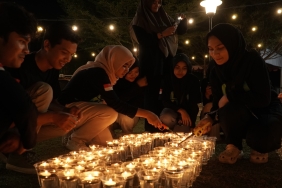EARTH HOUR: FREEDOM FROM THE ADDICTION OF FOSSIL ENERGY
Masayu Yulien Vinanda or familiarly called Nanda has joined WWF Jakarta for 3 years as Media Content Development Officer. In addition to developing content for the wwf.or.id website, blog, she is also the Managing Editor of Living Planet Magazine (a magazine for all WWF-Indonesia Supporters published every 4 months). Through his writing, he strives to make environmental issues more ""close"" to the lives of the wider community..Full author profile...
Jakarta (30/03)Climate change is actually a natural event. However, as a result of humans releasing large amounts of greenhouse gases into the atmosphere, the Earth's temperature has increased dramatically. This is what has come to be known as global warming.
The question then arises, "What kind of human activity is capable of releasing gases that threaten the survival of all Earth's inhabitants?" One of the most popular answers is the unstoppable consumption of electrical energy.
Electricity has become the main source of energy in every household and industrial activity. From kitchen appliances in homes, to lights and air conditioners in skyscrapers and shopping malls, to machinery in large factories, all require electricity.
However, this does not mean that we can justify the uncontrolled use of electricity. It's worth taking a moment to reflect on where electricity comes from.
The threat of an energy crisis
Generally, electricity is obtained by converting kinetic energy through a generator into electricity. The kinetic energy that drives the generator is obtained from steam produced from burning fossil energy sources such as coal, fuel oil, and natural gas.
Although there are other sources of energy that can also be utilized, namely water or air flow, fossil energy remains excellent. Yes, fossil fuels are relatively easy to obtain, but the consequences for the Earth are also significant. The greater the consumption of fossil energy, the faster it will deplete its reserves in the bowels of the Earth.
In addition to the problem of limited supply, every stage in the fossil energy process produces pollution and emissions that are harmful to the environment and humans. From its utilization to its final combustion, the emissions contribute to the increasing amount of greenhouse gases in the atmosphere. This in turn leads to global warming and climate change.
It is not wise to continue to rely on fossil fuels for our electricity. Our addiction to fossil fuels is causing our reserves to dwindle.
The term electricity crisis is not an exaggeration considering the rampant power outages that occur. Not only in remote villages far from energy sources, but also in big cities close to energy sources, even Jakarta is not spared from blackouts.
A high price to pay for uncontrolled electricity consumption. The limited capacity of existing power plants cannot keep up with the demand for electricity consumption. The wasteful use of electricity has resulted in reduced electricity supply. Rolling blackouts have become an inevitable option.
PT Perusahaan Listrik Negara has projected an increase in electricity consumption in its General Plan for Electricity Supply (RUPTL) for 2010-2019. The document states that electricity demand is estimated to reach 55,000 Mega Watts (MW). In other words, the average increase in electricity demand per year reaches 5,500 MW.
In order to meet the soaring demand for electricity, the electricity provider, PLN, began to work extra to increase the capacity of power plants in a number of locations. However, this solution will certainly be in vain if on the other hand energy waste still occurs. This is where public awareness to conserve electricity plays an important role in overcoming the threat of an electrical energy crisis.
Earth Hour
Energy efficiency is one of the key solutions to save the earth from global warming and energy crisis. One simple step, yet it has a significant impact.
This thought is the "breath" of Earth Hour, a global campaign for climate change initiated by WWF-Indonesia. By inviting all citizens of the world to turn off their lights and unused electrical appliances for one hour on the last Saturday of every March, Earth Hour plays a major role in energy-saving efforts. Earth Hour is a great way to save energy.
The focus of Earth Hour itself is deliberately centered on Java-Bali considering that electricity consumption on the two islands reaches 78 percent. Meanwhile, 23% of Indonesia's total electricity consumption is focused in DKI Jakarta and Tangerang.
As an illustration, if 10 percent of Jakarta residents turn off the lights, the Earth Hour campaign will be able to save 300MW. This is equivalent to powering one power plant. It is also equivalent to the electricity needed to power 900 villages.
Not only that, the lights-out campaign is also believed to reduce carbon dioxide emissions by 267.3 tons, equivalent to the emission absorption capacity of 267 20-year-old trees. The reduction in CO2 emissions is equivalent to the availability of oxygen for 534 people. Economically, one hour without lights can reduce Jakarta's electricity load by up to Rp 200 million.
Earth Hour reminds us that the occurrence of climate change also comes from the use of fossil fuel power plants.
fossil-fueled power plants so it takes our awareness of the importance of an energy-efficient lifestyle.
The electricity-saving movement is not limited to the goal of saving money on bills. More than that, saving electricity is also a solution to the electricity supply crisis and the threat of global warming.
By participating in Earth Hour, we not only contribute to saving energy supply in Indonesia, but also the world's energy. Don't forget to turn off the lights on Saturday, March 31, 2012, for 1 hour, 20.30-21.30.
For more information about Earth Hour, visit www.wwf.or.id/earthhour.


